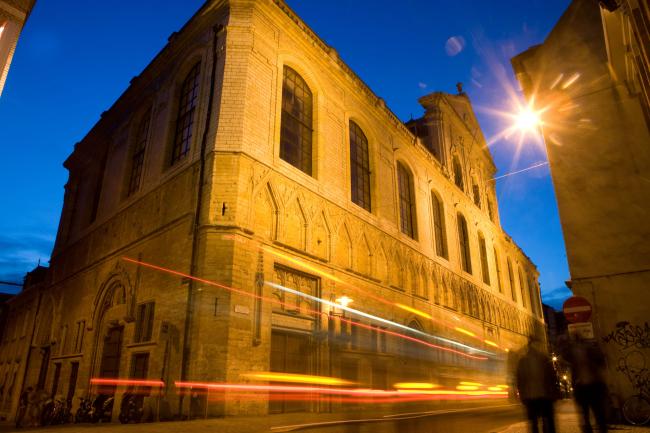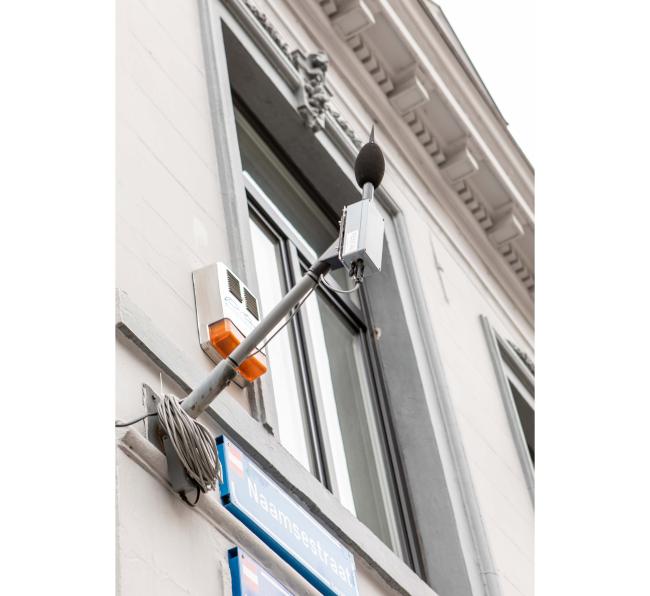Noise nuisance can become a real scourge that threatens the quality of life for residents. With innovative technology, such as artificial intelligence (AI) and the Internet of Things (IoT), the busy student city of Leuven wants to improve the identification of this persistent problem and, above all, tackle it more effectively. Inetum-Realdolmen was a partner in developing the solution.
Inetum-Realdolmen helps curb noise at night in Leuven

The City of Leuven is relatively small but densely populated. More than anything, it is a city with a significant student population. And students, as we well know, enthusiastically enjoy the nightlife. This inevitably causes a nuisance. Not only in the busy nightlife center itself, but also in the streets that people use before and after a night out. "Noise at night is a persistent problem in these streets," says Helena Schulpé, who works in the economy and trade department of the City of Leuven. She is a Smart City Leuven project coordinator and is responsible for projects that make use of innovative connected technology.
The City of Leuven has set up a team from the various city services to work specifically on the problem of noise at night. "The city has been trying to tackle the problem in an integrated manner for years while working closely with the police. This works because of the fines and also increases awareness because of the information campaigns," explains Helena Schulpé. "But it's not always clear what the different measures accomplish."
Measuring the noise nuisance
With financial support from VLAIO, the Flemish Innovation and Entrepreneurship Agency, the City of Leuven decided to start a pilot project on Naamsestraat, one of the infamous streets that lead to and from the nightlife area. The objective of the project is to reduce noise at night by using innovative technology.
"To do so, we first had to fully understand the problem and, in particular, objectively," says Helena Schuppé. "We do get official complaints about noise at night from local residents. But one person is more of a lighter sleeper than another, for instance. That's why we also want to determine, on an objective basis, how real the nuisance is and to what extent."
So, the City of Leuven installed seven sound sensors on Naamsestraat. These measure a number of parameters day and night, such as the noise volume in decibels and its pitch. "We don't record the noise," emphasizes the project coordinator. "We only collect processed and objective parameters so people can't be identified. This ensures that everything is done in line with strict privacy laws."
Classifying the noise nuisance
Not all noise is a nuisance, so the City of Leuven wanted to measure the sounds on Naamsestraat as well as classify them based on objective parameters. Again, without recording and storing the actual noise. "So, when there are noise peaks, we immediately know whether they are caused by people, traffic or sirens, for instance. Because there's also a hospital on Naamsestraat."
The City of Leuven sought expertise in the market to handle the technological part of the pilot project. A consortium of two parties emerged as the best candidate. The Dutch sound expert Munisense supplied items such as the sound monitoring system with the smart sound sensors. Inetum-Realdolmen in turn developed an algorithm and trained an AI model to automatically classify the captured sound.
Moreover, Inetum-Realdolmen also developed a mobile app for local residents and neighbors. They can use the app to report that they were disturbed in their sleep and also easily indicate what type of noise they think caused it. "This is how we get a clear view of the noise at night that wakes people up the most."

What I particularly like about working with Inetum-Realdolmen is that I have one point of contact for all my questions. They take every question, no matter how unexpected or far-reaching, completely seriously and always have an answer fairly quickly. The collaboration between the two partners in the consortium turned out equally well. We hardly noticed they were two different companies."
”Tackling the noise nuisance
In the final phase of the project (due to end in 2022), the City of Leuven will use the sensors and app to better understand the problem and link practical measures to the reports to effectively combat the noise at night. The sensors and the app will forward their information to the Smart City data platform that the City of Leuven uses to control street lighting, among other things. Inetum-Realdolmen will take care of the integration needed.
"The data platform allows us to automatically link measures to the type of sound," explains Helena Schulpé. "Shouting in the street, for instance, will then cause our Smart City system to automatically dim the lights at that location or even boost them. Another measure we're going to test is transmitting messages in the street to encourage the noise makers to stop their unruly behavior and go home."
"The idea may sound simple," concludes Helena Schulpé. "But behind the scenes, lots of technical fine-tuning is needed for such a project to succeed. And then, of course, it's great that our collaboration with the technology companies is going so well.
More case studies
Have a look at all our customer cases, sorted according to sector.